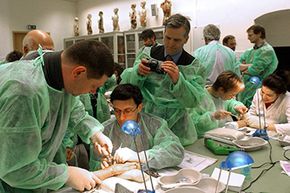Pros and Cons of Donating Your Body
On the fence about whether or not to donate your body to science? Perhaps you'll develop some clarity if you look at the pros and cons.
Pros: The biggest pro for donating your body is that you'll be helping advance science, medicine and potentially a host of other fields, such as car safety. Educational institutions use cadavers to teach students about anatomy; students and physicians use these bodies to practice various surgeries; and cadavers are helpful in running medical experiments to study diseases such as Parkinson's and Alzheimer's [source: Testa].
Advertisement
Another advantage of donating your body is that it saves you money. Funerals aren't cheap. Neither is cremation. In 2021, the average cost of a funeral with a casket was $7,848 [source: National Funeral Directors Association]. Even a simple cremation runs at least $1,500 and can set you back more than $6,971 if it's performed following a funeral service [source: Testa]. Donating your body is generally free, although there can be some minor charges, depending on the organization [source: Marsden].
Finally, arranging to donate your body can be a lot less time-consuming than planning a funeral, picking out a casket and headstone. However, if you still want to plan a memorial service when your cremains are returned to your family, it may be a wash.
Cons: For various medical reasons, organizations will not accept all donated bodies. If you don't have a contingency plan in place and they reject your body, your loved ones will have to scramble to put together a funeral at a very stressful time. Even worse, if you hadn't planned for this possibility, you could leave them with a sizeable, unexpected bill.
Always been a fan of organ donation? While some organizations, like Science Care, accept bodies for both organ and whole-body donation, most medical schools only accept bodies with all of their organs, since they use organs in their research (eyes still may be donated). If organ donation is important to you, make sure you know the rules of the group who will be taking your body [source: Testa].
Last, remember that once you die, your body needs to be handed over pretty quickly. While your family will eventually receive your cremains and may hold a memorial service at that time, they will generally not be able to have a funeral with your body shortly after death and then donate it. Some people may miss the therapeutic aspect of holding a funeral service, although they may opt for a memorial service without the body.
